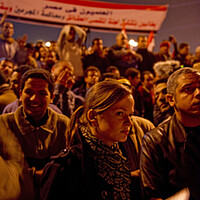Morsi trial opens new battleground for Egypt's military and Islamists
Loading...
| Cairo
Former President Mohamed Morsi was defiant as he appeared in court today, four months after he was ousted by Egypt's military.
Looking confident, the former president wore a suit instead of the white prison clothes worn by his co-defendants. Addressing the judge, he proclaimed himself the legitimate president of Egypt, rejected the authority of the court, and said those who ousted him should be tried instead. He and the Brotherhood leaders on trial with him raised the four-finger salute that has come to symbolize the opposition to the military-backed government.
It was his first public appearance since the military took him into custody on July 3, one year after he took office as Egypt's first freely elected president. Since then, he has been held largely incommunicado in an undisclosed location. State media reported he was taken to Borg Al Arab prison near Alexandria after the hearing, which was adjourned until Jan. 8.
The trial took place in the same venue as former President Hosni Mubarak's trial after the uprising that toppled him, highlighting the arc of Egypt's nearly three years of political turmoil that has also brought the military, which was a powerful institution under Mr. Mubarak, back into power.
Security was tight near the trial venue and throughout Cairo today, with Tahrir Square on lockdown and some schools closed. A small group of protesters gathered at the police academy on the outskirts of Cairo where the trial was held, while thousands gathered at the Supreme Constitutional Court to protest. But the government, in bringing them to trial, is riding a wave of popular anger at Morsi and the Brotherhood, the Islamist organization to which he belongs.
The trial comes amid a full-scale crackdown on the Brotherhood, in contrast to a near total lack of prosecutions of police for killing protesters. Together the developments give weight to accusations of a political vendetta and doubts about the credibility of the proceedings.
Khalil Al Anani, a senior fellow at the Middle East Institute in Washington, said both the Brotherhood and the military-backed government were using the trial to wage an “image battle.” The Brotherhood strove to portray the military-backed government as illegitimate, while the military attempted to prove its control and show it can bring Morsi to justice.
“If we look at the political implications of this trial, it will deepen the crisis and increase the polarization in society,” Mr. Anani says.
Morsi is standing trial with 14 others, including former presidential aides and top Brotherhood leaders.
They are charged with inciting violence in December 2012, when 11 people died in clashes between Morsi's supporters and opponents.
Protesters challenging the president had gathered near the palace, and the Muslim Brotherhood sent its supporters to remove them when the police refused.
In the ensuing clashes, Brotherhood supporters captured and detained protesters, beating them in an attempt to force confessions that they had been paid to protest. Morsi later appeared to reference the forced confessions in a speech. Many of the 11 people who died were Brotherhood supporters.
Morsi alienated many during his year in power by failing to right a sinking economy and by taking actions that were perceived as protecting the interests of Islamists, not all citizens. Millions of Egyptians turned out in the streets on June 30, asking him to step down and call early elections. On July 3, the military arrested him, named an interim president, and suspended the constitution, announcing plans to hold new elections.
In the wake of the coup, the new military-backed government launched a bloody crackdown on the Muslim Brotherhood. Thousands of members have been arrested, including many top and mid-level leaders. On Aug. 14, security forces cleared Islamist sit-ins protesting the coup, killing hundreds. Dozens of police were also killed. The crackdown on the Brotherhood has wide support among Egyptians, partially because the government, along with state and private media, has branded group members as terrorists.
But at the Supreme Constitutional Court, where thousands gathered to reject the proceedings, protesters decried what they called a miscarriage of justice.
“The trial will not be fair at all,” said protester Asmaa Mustafa, a teacher. “Mubarak corrupted the judges, the media, the police, the Army. So I think the judges are not fair – they are the same ones who acquitted Mubarak.”
Morsi provoked strong opposition in the judiciary when he attempted to reform the institution, saying he was trying to root out corruption. His opponents saw instead an attempt to curb their independence and push into retirement judges who were unfriendly to Islamists. Judges were also angered by Morsi's temporary decree to make his actions immune from judicial review.
Others said the trial was a way to justify the coup and the crackdown on the Brotherhood, and noted that police were not on trial for killing protesters.
“Where are the dogs who killed the protesters? Why aren't they on trial?” asked protester Mustafa Mohamed Gharib, a student at Al Azhar University. “If Morsi is on trial, shouldn't his interior minister be on trial, too?” he asked, referring to the government official in charge of police. “We're here for our rights and for democracy. We won't sit and let tyrants run over us for another 60 years.”






